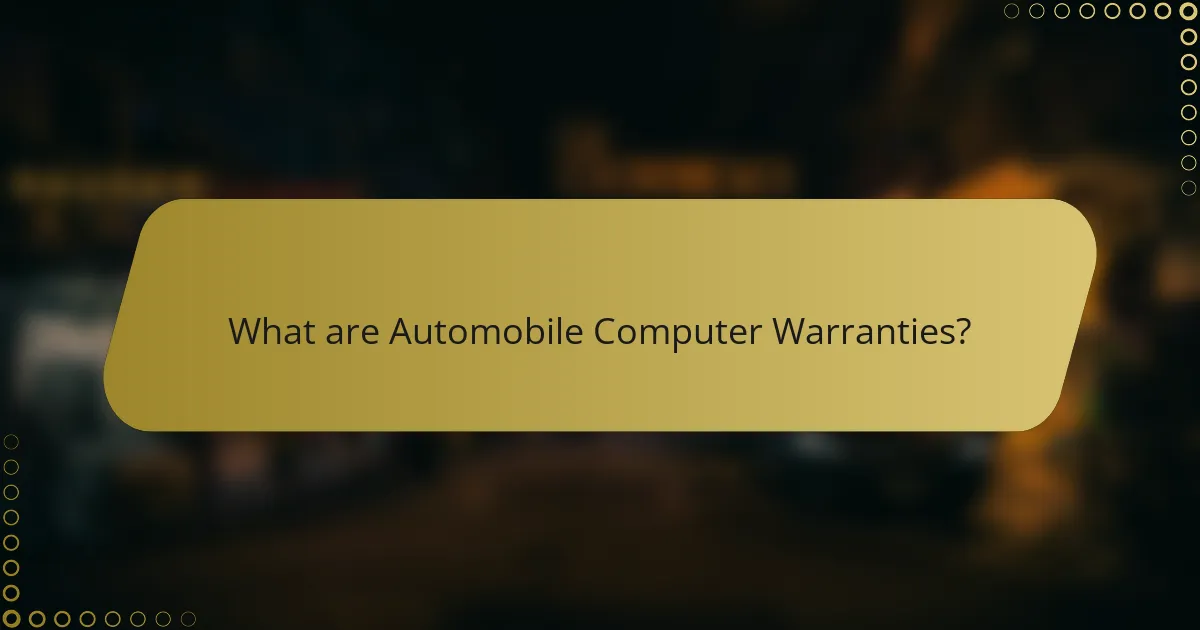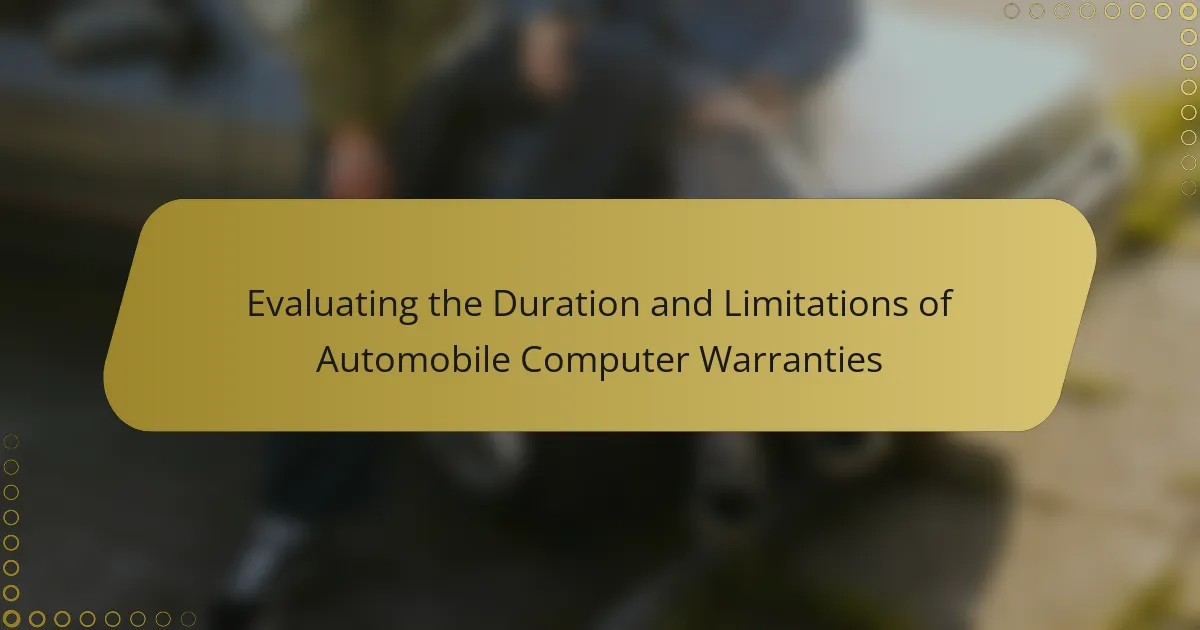Automobile computer warranties are guarantees provided by manufacturers or dealers for the electronic control units in vehicles, covering repairs or replacements of malfunctioning computer systems. These warranties typically last between three to five years and may include mileage limits ranging from 36,000 to 60,000 miles. Coverage often encompasses issues related to engine control, transmission control, and other essential electronic components. Proof of warranty validity is required at the time of service, and these warranties are designed to enhance customer confidence in vehicle technology. This article evaluates the duration and limitations of automobile computer warranties, providing essential insights for vehicle owners.

What are Automobile Computer Warranties?
Automobile computer warranties are guarantees provided by manufacturers or dealers for the electronic control units in vehicles. These warranties cover repairs or replacements of malfunctioning computer systems. Typically, they last for a specific duration, often ranging from three to five years. Some warranties may also have mileage limits, such as 36,000 to 60,000 miles. The coverage can include issues related to engine control, transmission control, and other critical electronic components. Proof of warranty validity is usually required at the time of service. Many automobile manufacturers offer these warranties to enhance customer confidence in their vehicle technology.
How do Automobile Computer Warranties function?
Automobile computer warranties cover the electronic systems in vehicles. These warranties typically include repairs or replacements for malfunctioning components. They function by providing coverage for a specified duration or mileage limit. Most warranties start from the vehicle’s purchase date. They may vary in coverage based on the manufacturer or dealership. Common components covered include engine control units and infotainment systems. Warranties often require regular maintenance to remain valid. Documentation of repairs may be necessary for claims.
What components are covered under Automobile Computer Warranties?
Automobile computer warranties typically cover the vehicle’s engine control unit (ECU), transmission control unit (TCU), and anti-lock braking system (ABS) module. These components are crucial for the vehicle’s functionality and performance. Additionally, warranties may include coverage for electronic control modules related to safety and emissions systems. Such coverage ensures that essential electronic systems are protected against defects and failures. Warranties often specify the duration and limitations of coverage, which can vary significantly between manufacturers. Understanding these components helps vehicle owners make informed decisions about warranty options.
How do warranties differ between vehicle manufacturers?
Warranties differ between vehicle manufacturers in terms of duration, coverage, and terms. Some manufacturers offer basic warranties lasting three years or 36,000 miles, while others extend to five years or 60,000 miles. Coverage can include powertrain, bumper-to-bumper, and corrosion warranties. Certain brands provide additional perks like roadside assistance or complimentary maintenance. Specific exclusions and limitations also vary, affecting components covered. For instance, some warranties do not cover wear-and-tear items like brake pads. Manufacturers like Hyundai and Kia are known for their longer warranties compared to brands like BMW or Mercedes, which typically offer shorter terms. This variability allows consumers to choose based on their preferences for reliability and service.
What is the typical duration of Automobile Computer Warranties?
The typical duration of automobile computer warranties is usually between 3 to 5 years. Many manufacturers provide warranties that last for this period. Some extended warranties may offer coverage for up to 7 years. The mileage limit often ranges from 36,000 to 100,000 miles. Factors influencing the duration include the manufacturer and the specific vehicle model. Additionally, warranty terms can vary based on the type of coverage purchased. Comprehensive policies may offer longer protection. Always check the warranty details for specific terms and conditions.
How is the duration determined for different vehicle models?
The duration for different vehicle models is determined by manufacturer specifications and warranty policies. Each vehicle model undergoes testing to assess its performance and reliability. Manufacturers analyze data from various factors, including component durability and expected lifespan. The warranty duration typically reflects these assessments. For example, many manufacturers offer warranties ranging from three to ten years. This duration can also vary based on the vehicle type, such as electric versus gasoline models. Additionally, regional regulations may influence warranty terms. Ultimately, the duration aims to provide consumers with confidence in their vehicle’s reliability.
What factors influence the length of a warranty period?
The length of a warranty period is influenced by several key factors. Manufacturer reputation plays a significant role; established brands often offer longer warranties. Product complexity also affects warranty duration; more complex parts typically come with extended coverage. Market competition influences warranty lengths as companies may extend warranties to attract customers. Regulatory requirements in different regions can mandate minimum warranty periods. Consumer expectations shape warranty offerings; higher expectations often lead to longer warranties. Lastly, the cost of repairs and replacement can dictate warranty lengths; higher costs may encourage longer coverage to ensure customer satisfaction.
What limitations are commonly associated with Automobile Computer Warranties?
Automobile computer warranties commonly have limitations that affect their coverage. These limitations often include exclusions for certain components. For instance, warranties may not cover software issues or updates. Additionally, they might exclude damage caused by improper installation. Many warranties have mileage or time limits that restrict claims. Some warranties may also require regular maintenance to remain valid. Furthermore, pre-existing conditions are typically not covered. Lastly, the warranty may be voided if unauthorized repairs are made.
What exclusions are typically found in these warranties?
Exclusions typically found in automobile computer warranties include damage caused by accidents or collisions. Warranties often do not cover issues resulting from improper installation or modifications. Environmental factors, such as extreme temperatures or moisture, are usually excluded. Additionally, wear and tear from regular use is commonly not covered. Unauthorized repairs or alterations can void warranty coverage. Software-related problems may also be excluded if they arise from user error. Many warranties do not cover items deemed consumables, like batteries. These exclusions ensure that warranties protect against specific, unforeseen failures rather than general maintenance issues.
How do mileage limits affect warranty coverage?
Mileage limits directly impact warranty coverage by defining the maximum distance a vehicle can travel while still being eligible for warranty claims. Exceeding these limits typically voids the warranty, meaning that any repairs or replacements needed after the mileage threshold will not be covered. Most manufacturers set these limits to encourage regular maintenance and ensure that vehicles are used within their intended operational parameters. For example, a common mileage limit is 36,000 miles for basic warranties, which often lasts for three years. This means that if a vehicle surpasses this limit, the owner may be responsible for all repair costs. Additionally, some warranties may have separate limits for different components, such as powertrains or electronic systems. Understanding these mileage limits is crucial for vehicle owners to maintain their warranty coverage effectively.
How can consumers evaluate their Automobile Computer Warranty options?
Consumers can evaluate their Automobile Computer Warranty options by comparing coverage details. They should examine what components are included in the warranty. Key aspects include duration, limitations, and exclusions of coverage. Consumers must also check the warranty provider’s reputation and customer reviews. Analyzing the terms and conditions is essential for understanding the warranty’s scope. Additionally, they should consider the cost versus potential repair expenses. Researching industry standards can provide insights into typical warranty offerings. Lastly, consumers may benefit from consulting with automotive professionals for expert opinions.
What questions should consumers ask when considering a warranty?
What questions should consumers ask when considering a warranty? Consumers should ask about coverage details, including what components are included and excluded. They should inquire about the duration of the warranty and whether it is transferable. Understanding the claims process is also crucial. Consumers should ask about the warranty provider’s reputation and customer service. It’s important to know if there are any deductibles or fees associated with claims. Consumers should also confirm if the warranty covers labor costs for repairs. Lastly, they should ask about any limitations or conditions that may void the warranty.
How can consumers compare different warranty offerings effectively?
Consumers can compare different warranty offerings effectively by evaluating key attributes such as coverage duration, limitations, and exclusions. They should examine the specific components covered under each warranty. This includes parts, labor, and any additional services.
Next, consumers should assess the warranty’s terms regarding transferability and cancellation. Understanding whether a warranty can be transferred to a new owner can impact its value. Additionally, reviewing customer feedback and ratings on warranty providers can provide insights into reliability and service quality.
Finally, consumers should consider the price of the warranty relative to the benefits offered. A higher price does not always guarantee better coverage. By analyzing these factors, consumers can make informed decisions on which warranty best meets their needs.
What practical tips can help in understanding and utilizing Automobile Computer Warranties?
Read the warranty document carefully. Understand the terms and conditions outlined. Identify what components are covered under the warranty. Check for any exclusions or limitations specified. Note the duration of the coverage period. Keep records of all maintenance and repairs performed. Contact the warranty provider for clarification on any unclear aspects. Utilize the warranty for eligible repairs to avoid out-of-pocket expenses.
How can consumers ensure they are maximizing their warranty benefits?
Consumers can maximize their warranty benefits by understanding the terms and conditions of their warranty. They should read the warranty documentation carefully. This includes knowing the duration, coverage limits, and specific exclusions. Consumers must also keep all receipts and documentation related to their purchase. This proof is essential for claiming warranty services. Regular maintenance of the vehicle can prevent warranty voiding. Following the manufacturer’s maintenance schedule is crucial. Additionally, consumers should register their warranty with the manufacturer if required. This ensures they receive updates and relevant information. Engaging with customer service for any clarifications can further enhance understanding.
What common mistakes should consumers avoid when dealing with warranties?
Consumers should avoid failing to read warranty terms carefully. Many warranties have specific conditions that must be met for coverage. Ignoring these details can lead to unexpected denials of claims. Another mistake is not keeping receipts or documentation. Without proof of purchase, warranty claims may be rejected. Consumers also often overlook warranty expiration dates. Missing these deadlines can result in losing coverage entirely. Additionally, some consumers assume all damages are covered. Certain warranties exclude specific types of damage or wear. Not understanding these exclusions can lead to disappointment. Lastly, consumers should avoid relying solely on verbal agreements. Written warranties provide clear terms and conditions for reference.
Automobile computer warranties are guarantees provided by manufacturers or dealers that cover repairs or replacements for electronic control units in vehicles, typically lasting between three to five years with specific mileage limits. This article evaluates the duration and limitations of these warranties, detailing the components covered, differences among manufacturers, and the factors influencing warranty lengths. It also addresses common exclusions, how mileage limits affect coverage, and provides practical tips for consumers to maximize their warranty benefits. Understanding these aspects is essential for vehicle owners to make informed decisions regarding their warranty options.
